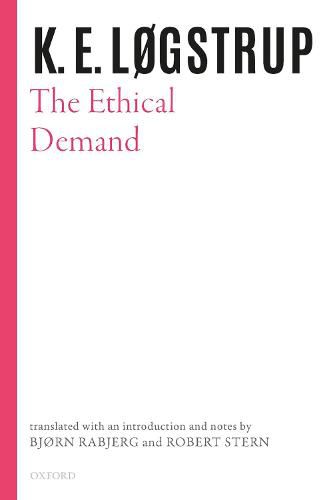Readings Newsletter
Become a Readings Member to make your shopping experience even easier.
Sign in or sign up for free!
You’re not far away from qualifying for FREE standard shipping within Australia
You’ve qualified for FREE standard shipping within Australia
The cart is loading…






The Ethical Demand (1956) by K. E. Logstrup is one of the great works of modern moral philosophy: it is presented here in a new translation with introduction and notes. Logstrup puts forward his distinctive view concerning our vulnerability to each other and what this requires of us in response. He starts by considering Jesus’s ‘proclamation’ to love your neighbour and how this can be understood in ‘purely human terms’ as relating to basic features of our existence. Reflecting on the phenomenon of trust, Logstrup emphasizes the fundamental interdependence of human life and how this gives rise to an ‘ethical demand’ on us to care for the other, which he characterizes as radical, silent, one-sided, and unfulfillable. In order to make sense of a demand of this sort, Logstrup argues, we must see ‘life as a gift’, rather than treating ourselves as the sovereign grounds for our own existence. He contrasts this demand to social norms, which are often reciprocal in this way, and argues that while such norms are changeable, the ethical demand itself is absolute. Logstrup therefore makes a fundamental contribution to our understanding of the nature of-and basis for-our obligations to each other. In this critical edition, Logstrup’s original text is accurately rendered into readable English and paired with an introduction which explains the main themes and wider context of the work.
$9.00 standard shipping within Australia
FREE standard shipping within Australia for orders over $100.00
Express & International shipping calculated at checkout
Stock availability can be subject to change without notice. We recommend calling the shop or contacting our online team to check availability of low stock items. Please see our Shopping Online page for more details.
The Ethical Demand (1956) by K. E. Logstrup is one of the great works of modern moral philosophy: it is presented here in a new translation with introduction and notes. Logstrup puts forward his distinctive view concerning our vulnerability to each other and what this requires of us in response. He starts by considering Jesus’s ‘proclamation’ to love your neighbour and how this can be understood in ‘purely human terms’ as relating to basic features of our existence. Reflecting on the phenomenon of trust, Logstrup emphasizes the fundamental interdependence of human life and how this gives rise to an ‘ethical demand’ on us to care for the other, which he characterizes as radical, silent, one-sided, and unfulfillable. In order to make sense of a demand of this sort, Logstrup argues, we must see ‘life as a gift’, rather than treating ourselves as the sovereign grounds for our own existence. He contrasts this demand to social norms, which are often reciprocal in this way, and argues that while such norms are changeable, the ethical demand itself is absolute. Logstrup therefore makes a fundamental contribution to our understanding of the nature of-and basis for-our obligations to each other. In this critical edition, Logstrup’s original text is accurately rendered into readable English and paired with an introduction which explains the main themes and wider context of the work.